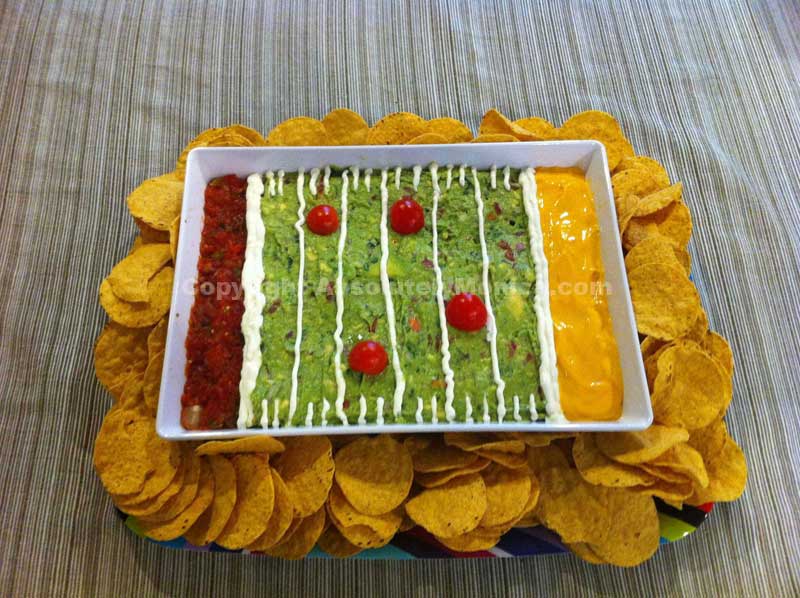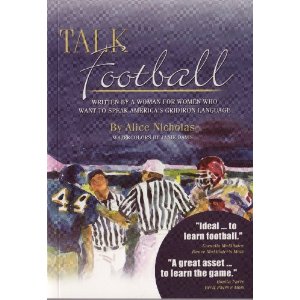We didn’t watch much football at our house when I was growing up—maybe if the Ohio State Buckeyes played in the New Year’s Day Rose Bowl game or if our family invited friends over to watch the Super Bowl championship. 
So I was like a fish out of water after college when friends gathered to watch the sport. Mainly there for the fun and interaction, I didn’t pay much attention to what was happening on the field. But everyone was into it, and I was left out. Listening to what my friends said while spectating, I started asking questions about why they said what they did. Not surprisingly I began to learn more about the rules…and actually enjoy the game.
Then I practiced saying many of the same things and was amazed at the positive reaction I received—especially from men. They were taking notice and I was scoring points with them. Those were in my single days; I liked this. They seemed smugly impressed with my “knowledge” and enthusiasm. No longer did I stay in the kitchen to make brownies. I was in the middle of the action, where the guys were. And face it—for at least 4 months of the year on Sunday afternoons and Monday nights, most American guys are in front of the screen.
A couple of years ago I read in American Way Magazine that women now make up nearly half of the NFL viewing audience and in 2008 alone spent more than $150 million on fan apparel. We represent more than 40 percent of the NFL fan base, which means it’s one of the largest and fastest-growing female fan bases in all of sports. It’s estimated that 45 million women watch NFL games each weekend and that 375,000-plus attend the match-ups in person. We are into the game!
Tons of books out there teach the rules of the game— everything from the exact dimensions of the football playing field to the meanings of every referee signal and from the defensive lineup positions to actual play configurations. Really boring for my purposes. At the time I just wanted to know how to sound like I knew what I was talking about.
So, I started writing down what I heard and learned to know what to say during a game. If you say these lines with gusto, you’ll fit in, sound smart, and probably will not have to back up your statements. If you think you might get into a bind, it’s always a good idea to toss out your line and then say, “I’m going to the kitchen for more chips. Does anybody need anything?” Then make your exit!
Just as with most endeavors, talking about a game will take some work. If you want to increase your knowledge and converse more intelligently, here are some things you can do:
- Go online: All professional teams have a Web site so you can brush up on player names before a game. And check these out for the latest: NFL.com / ESPN.com / SportsIllustrated.com
- Read USA Today: There’s a Monday wrap-up of Sunday games and Tuesday wrap-up of Monday Night Football.
- Turn on the radio: Listen to some talk radio sports stations—in your car on the way to and from work. You’ll pick up the jargon. The airwaves are full of these shows, especially in the heat of the football season.
- Read Sports Illustrated …while in line at the grocery store. Published weekly, this will update you on the latest “big” sports stories and keep you in-the-know.
- Watch ESPN Sports Center: This cable program is the life-blood of sports news and information.
Also, pick one big thing to throw out at football-watching parties—invest in reading a newspaper beforehand to get a key story. Prior to Super Bowl XXX, I saw a TV news story about the coach of one team who recently had a heart attack and surgery. Everyone thought this would be his last game. He also had coached at one time for the opposing team. So, when I was asked which team I was rooting for, I said this coach’s team because he was the underdog. And I kept repeating the same story. It got me through the entire pre-game, game and post-game discussions!
Have fun with this. And just watch how you’ll start scoring points of your own.
To Get You in the Game: What You’re Talking About
- The “NFL” or National Football League: Made up of two conferences—the NFC (National Football Conference) and the AFC (American Football Conference).
- Quarterback: He’s on the offense. This is the guy who throws the ball. You’ll spot him by the numbers on his jersey, which are between 3 and 15.
- Snap: The handing of the ball by the Center, reaching back between his legs, to the Quarterback or Punter
- Receiver: A member of the offense whose job it is to get into the open to catch a pass from the Quarterback and then run with the ball. Wide Receivers have numbers 80 – 89 on their jerseys. Running Backs have numbers 20 – 49. This always threw me. Even if a guy catches a pass, if he has the wrong number on his jersey, it doesn’t count and is considered “incomplete”
- Hang time: The time a ball remains in the air after being kicked—they actually have a TV screen graphic digital timer that counts this
- Touchdown: Carrying the ball into or catching the ball in the opposition’s end zone. Worth six points. Both feet of the receiver must be in end zone for touchdown to be legal (so many rules!)
- Turnover: Losing possession of the ball, usually by Player/team error
- Turnover ratio: Whoever had fewest turnovers wins 90% of the time
- Time of possession: Meaningless
- Red zone: Inside the 20 yard line before the end zone
What to Say When Your Team Is Holding the Football
- Flag on the play at the line of scrimmage: “Who moved?”
- Said to team or Quarterback about making a long pass: “Go for the bomb!”
- Quarterback throws pass: “Air it out, baby.”
- Applaud the Quarterback: “That was a tight pass.”
- You hear cheering when your team makes a first down: “First down, baby!”— say it like Austin Powers
- Overthrown ball: “That went on to the cones, man.”
- Pass not received: “He really boomed that one.”
- Fumble: “Just fall on it!!”
- Touchdown: “I’ve scored on that play before.”
- After touchdown (only if your team’s not far ahead): “Go for 2!”
- If your team’s behind and you think the team believes the only way to make up the difference is to make a touchdown. They could start to make it up with a 3-point field goal: “Stop thinkin’ six!”
- Any good play: “That’s amazing; they don’t usually run this play.”
- Player falls down on the field and doesn’t get up: “He just got the wind knocked out of him.”
- Grabs his knee after the fall: “No, it’s his A-C-L.”
- Runner escaped bad situation: “He dodged the bullet.”
- If winning: “We are whippin’ some tail!”
- Losing at 1/2 time: “You better get a game plan together, man!”
- Flag in defensive (pass interference): “Interference?! Who’d they call it on?”
What to Say When Your Team Is NOT Holding the Football
- Said to Defense before ball is snapped: “Stuff ’em!”
- Good defensive play: “Good ’D.’”
- Your team is keeping other team from advancing: “We’re pushing them back.”
- Any great play: “Sweeeeeeeeet!”
- Any bad play: “That’s a penalty – blow the whistle!” / “That was a bad call!” / “That’s so weak!”
- Said about opposing team’s running back: “My momma could outrun him.”
- Player calls a time-out : “How many time-outs do they have?”
- Bad referee call on your team: “Who paid the ref on that one?”
- Player barely makes play: “That was squeakin’ it out”
- Tackle guy with ball even if it means your team will lose yardage: “Nail him for a loss.”
- Slam tackle: “He got pancaked.”
- Yellow flag on the play: “Holding” (you’ll be right 60% of the time)
- Runner with ball is running toward sidelines: “Turn the corner!”
- Projected difference in scores between two teams set to play: “What’s the ‘line?’” / “What’s the ‘spread?’”
- “Calling an audible”: This is what the Quarterback can do when he is at the line of scrimmage and changes the play that was previously called in the huddle. He makes the call because of some change he sees in the opposing team’s line of defense. Use this term in a business meeting and it means you’re changing the previously discussed plan. It’s impressive!
- Team is running with ball and trying to break line of defense: “Break it”—as in line of defense
Extra Points
If you’re really feeling adventurous, here are some hard-core resources for you:

